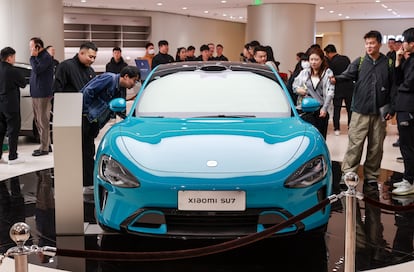Xiaomi’s Porsche look-alike EV triumphs where Apple failed
The Chinese company’s stock surged after its SU7 electric car garnered 90,000 orders in 24 hours

The Chinese bid to conquer the automobile industry has just intensified. Xiaomi, a technology company known for affordable mobile phones, has entered the market with its SU7 electric car that looks like a Porsche but costs less than a Tesla. With the capability to accelerate from zero to 60 MPH in 2.78 seconds, it rivals the speed of the Porsche Taycan Turbo GT, the fastest EV at 2.2 seconds. The Taycan Turbo GT’s price hovers around $250,000 (depending on options), while Xiaomi offers the SU7 for $30,250-$41,450, taking direct aim at the Tesla Model 3, which starts at just under $39,000
The Chinese tech company has successfully broken into a new market with strong customer support. In just 24 hours after its launch in late March, the SU7 garnered 90,000 orders, leading to an 8.97% surge in Xiaomi’s share price on the Hong Kong Stock Exchange. With a $10 billion investment, Xiaomi looks poised to succeed where Apple failed.
“During my three years developing this car, I’ve learned that manufacturing vehicles is incredibly challenging. Even Apple, a giant in the industry, gave up on it,” said Xiaomi co-founder and CEO Lei Jun at the launch of the SU7. To be fair, Apple was developing a different product — a fully autonomous, electric luxury vehicle priced at around $100,000. After a decade of research and effort involving 2,000 employees, Bloomberg reported in February that Apple had canceled the project.
Apple’s doubts about whether electric vehicles could offer the margins it wanted led the company to shift those resources to developing generative artificial intelligence, a technology that other major corporations like Microsoft have heavily invested in. Microsoft overtook Apple as the world’s most valuable public company in January.
Meanwhile, Xiamoi is betting heavily on the automotive industry, demonstrating the same focus on global dominance shown in other industries. “If we work hard over the next 15 to 20 years, we aim to be among the top five car manufacturers globally and help drive growth in the Chinese auto industry as a whole,” Lei Jun said last December, in a statement reported by Reuters.
More automakers, fewer sales
Xiaomi enters the automotive industry amid a global slowdown in electric vehicle sales. Tesla forecasts reduced sales growth in 2024 compared to 2023, and reported that deliveries dipped by 8.5% from January to March this year. Electric vehicle sales in Europe saw a 17.4% increase by February, but the growth rate has slowed compared to previous years. Germany experienced a decline in pure electric car sales due to the government withdrawing consumer incentives. In China, electric vehicle sales are expected to rise by 25% this year, down from 36% the year before and 96% in 2022.
Market growth is slowing down as new players enter the scene to challenge established manufacturers like Volkswagen, Ford, General Motors and Stellantis. These giants are investing billions in transitioning from combustion engines to electric vehicles. Chinese companies like BYD and SAIC Motor (which owns the British brand MG) have started expanding beyond China and gaining market share.
Given the gloomy outlook, European giants like Renault and Volkswagen have chosen to backtrack on their plans to go public with their electric car divisions and software divisions (Ampere for Renault and PowerCo for Volkswagen). Both companies are also exploring the possibility of jointly producing a €20,000 electric vehicle to compete against Chinese brands under scrutiny by the European Commission for suspected illegal government subsidies. These subsidies, along with lower energy and labor costs, could enable Asian companies to offer more affordable electric vehicles compared to their European counterparts.
“In recent years, major economic powers aimed to create economies of scale by subsidizing battery production directly with companies or indirectly with consumers to promote adoption,” said Clément Inbona, fund manager at La Financière de l’Échiquier, a French fund manager. “With all these market distortions, China, the U.S. and Europe have been accusing each other of dumping. Recently, Treasury Secretary Janet Yellen voiced concerns about China’s excess capacity and its global impact.” Inbona noted that the United States also faces criticism for subsidies, exemplified by the Inflation Reduction Act (IRA) — a $400 billion program to incentivize green projects.
Sign up for our weekly newsletter to get more English-language news coverage from EL PAÍS USA Edition
Tu suscripción se está usando en otro dispositivo
¿Quieres añadir otro usuario a tu suscripción?
Si continúas leyendo en este dispositivo, no se podrá leer en el otro.
FlechaTu suscripción se está usando en otro dispositivo y solo puedes acceder a EL PAÍS desde un dispositivo a la vez.
Si quieres compartir tu cuenta, cambia tu suscripción a la modalidad Premium, así podrás añadir otro usuario. Cada uno accederá con su propia cuenta de email, lo que os permitirá personalizar vuestra experiencia en EL PAÍS.
¿Tienes una suscripción de empresa? Accede aquí para contratar más cuentas.
En el caso de no saber quién está usando tu cuenta, te recomendamos cambiar tu contraseña aquí.
Si decides continuar compartiendo tu cuenta, este mensaje se mostrará en tu dispositivo y en el de la otra persona que está usando tu cuenta de forma indefinida, afectando a tu experiencia de lectura. Puedes consultar aquí los términos y condiciones de la suscripción digital.









































